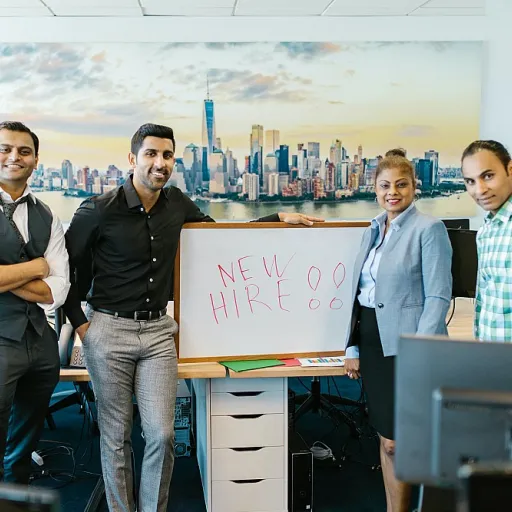Understanding the Role of DevOps Engineers
The Evolving Role of DevOps Experts in Modern Businesses
Understanding the role of a DevOps Engineer is crucial for any organization looking to cultivate a highly efficient development and operational environment. In a landscape dominated by digital transformation, DevOps engineers have become pivotal in bridging the gap between software development and IT operations.
DevOps is a methodology focused on automating and streamlining the processes of continuous integration and development operations. By employing DevOps professionals, your organization can ensure the smooth delivery and integration of software projects, thereby increasing the speed and efficiency of deployment processes.
DevOps Engineers require expertise in managing infrastructure as code, cloud infrastructure, and tools such as Docker and AWS. These engineers excel at creating a robust, scalable environment that supports the dynamic needs of software development and deployment.
Hiring the right DevOps talent means identifying candidates who not only possess profound technical knowledge but also display readiness to adapt to global team dynamics, whether on-site or as remote DevOps team members. As the technology landscape evolves, the demand for these engineers has surged, necessitating a strategic approach in recruitment to find top talent that aligns with your organizational goals.
Organizations also look for DevOps engineers with experience years that reflect their ability to handle complex infrastructure and implement processes that have been successfully delivered in previous engagements.
To successfully
enhance your hiring process with a direct sourcing approach can significantly benefit organizations in finding pre-vetted professionals who can mesh seamlessly with your existing cloud and development operations setups. Ultimately, the right DevOps hire can take your infrastructure to new heights, driving productivity and innovation.
Crafting an Attractive Job Description
Making Your Job Description Stand Out
Crafting an engaging and informative job description is essential when looking to hire skilled DevOps engineers. An effective job listing not only attracts top talent but also paves the way for a smoother hiring process.
First, delineate the specific role the DevOps engineer will fill in your team. Clearly state the responsibilities, such as improving cloud infrastructure, managing deployment processes, and maintaining continuous integration. By doing so, candidates can better understand what is expected and how their expertise will contribute to your development operations.
Key Elements to Include
- Position Title and Summary: Start with a clear and concise title, like "Senior DevOps Engineer," followed by a brief summary of the role. This can set the stage for what prospective candidates can expect in terms of duties and workplace culture.
- Essential Skills and Experience: Highlight crucial skills, such as using tools like Docker and AWS, and possessing a solid grasp of infrastructure as code. Detailing these skills helps to filter candidates who can handle the intricacies of your projects.
- Qualification Requirements: Specify the qualifications, such as years of experience in software development and familiarity with cloud platforms like AWS or Azure. This ensures you're targeting candidates who can immediately contribute to the team.
- Company Culture and Values: Sharing a bit about your company culture and values can differentiate your listing from others and attract candidates who are a cultural fit.
Optimizing for Talent Discovery
When optimizing your job description for talent discovery, use relevant keywords throughout the text. Incorporate terms like "remote devops," "devops developers," and "looking to hire devops engineers" naturally within the description. This approach not only improves searchability but also aligns with the language of professionals in the industry.
For further insights on enhancing job descriptions, you may explore
enhancing your hiring process with a direct sourcing approach to streamline talent acquisition. By refining how you write job postings, you are one step closer to adding valuable DevOps professionals to your team.
Effective Sourcing Strategies
Adopting Strategic Approaches to Locate DevOps Talent
In the ever-evolving landscape of development operations, sourcing the right candidates is pivotal for building a robust DevOps team. With the increasing reliance on cloud infrastructures and the demand for seamless integration and delivery, adopting effective strategies to find and attract top DevOps engineers can greatly impact your organization.
The first step in locating potential hires involves tapping into various sources to discover where the best talent might be found. Using platforms that host DevOps communities can be quite beneficial. These platforms not only provide access to pre-vetted devops developers but also serve as hubs where professionals exchange knowledge and showcase their experience, tools, and expertise. Websites focused on software development and engineering, such as GitHub and Stack Overflow, are particularly valuable for identifying engineers who contribute to open-source projects.
Engaging specialized recruitment agencies can further streamline the sourcing process. These agencies typically have vast networks of professionals with years of experience in Infrastructure as Code (IaC), cloud solutions like AWS Azure, and other DevOps tools, including Docker and continuous integration systems. By leveraging these agencies, you can access a pool of candidates who are not only technically skilled but also culturally fit for your organization.
Additionally, consider attending industry conferences and workshops to meet potential candidates face to face. Events focusing on cloud infrastructure and deployment processes act as excellent networking opportunities where you can directly interact with devops professionals, learning about their challenges, achievements, and how they delivered on past projects. This human-centric approach can reveal a candidate's passion and alignment with your team’s vision.
For remote DevOps positions, expanding your search on global freelance platforms could prove advantageous. As more teams embrace remote work in the development sphere, you are likely to find skilled engineers who excel in building and maintaining complex infrastructures while collaborating virtually using advanced communication tools.
In conclusion, using a strategic sourcing approach tailored to draw in the right devops talent will pave the way for a more comprehensive hiring process. By targeting well-known development platforms, engaging with specialized agencies, attending industry events, and exploring global opportunities, you can effectively build a team of competent DevOps engineers ready to handle your organization's future challenges effectively. For more strategies on successfully hiring distinct roles, you can explore effective techniques for attracting skilled professionals
here.
Conducting Insightful Interviews
Mastering the Art of Revealing Insights through Interviews
Conducting interviews to hire DevOps engineers requires strategic planning and a keen understanding of what to assess in potential candidates. The goal is to uncover not just technical competency but also a candidate's ability to integrate seamlessly into your organization’s established processes and cloud infrastructure.
To achieve this, interviews should delve into three key areas:
- Understanding of DevOps Principles and Tools: Potential hires should demonstrate a strong grasp of DevOps principles, such as continuous integration and continuous delivery (CI/CD). Ask candidates to describe their experience with essential tools like Docker, AWS, and Azure. Their responses can provide insight into their expertise and hands-on experience with infrastructure as code, which is crucial for maintaining efficient development operations.
- Problem-Solving Capabilities: Present real-world scenarios that devops professionals might face, such as debugging cloud infrastructure issues or improving existing deployment processes. Evaluating a candidate’s approach to these challenges can reveal their problem-solving skills and how they adapt their solutions to align with your team’s needs.
- Team Collaboration and Communication: DevOps work requires seamless collaboration between development and operations teams. Discuss with your candidates their experience years and how they have facilitated communication and teamwork in their previous roles. Understanding their ability to operate in a global team or remote DevOps environments is vital as it impacts project delivered efficiency and team dynamics.
Conducting insightful interviews not only helps in identifying top DevOps talent but also ensures you hire professionals who can drive your development processes forward, meet the dynamic tech demands, and contribute positively to the team’s success.
Evaluating Technical Skills
Evaluating Technical Expertise of DevOps Candidates
When aiming to hire top talent in the field of DevOps, a crucial step is effectively evaluating the technical expertise of potential candidates. Given the dynamic nature of the role, it involves a comprehensive assessment of several key skills and tools.
Firstly, assess the candidate's proficiency with popular DevOps tools such as Docker, AWS, and Azure. These are essential, as they are widely used in cloud infrastructure and integration delivery processes. Candidates should demonstrate hands-on experience with tools that facilitate continuous integration and deployment processes.
It is also important to gauge their understanding of infrastructure as code. This is vital for modern development projects where infrastructure deployment is automated and managed like software development. Understanding code principles will help engineers streamline development operations efficiently.
Consider testing their problem-solving abilities through a practical task. This could involve solving a cloud infrastructure challenge or optimizing an existing deployment pipeline on platforms like AWS or Azure. Such tasks will give insights into their real-world capabilities.
Moreover, assess the candidates' experience years in DevOps environments and their ability to work within a team framework. This not only gauges their technical know-how but also their ability to integrate quickly with existing teams to deliver projects smoothly.
Finally, look for the ability to work in a global and remote DevOps team setup, showcasing flexibility in handling diverse work environments and experiences, a valuable asset in modern global project delivery.
Incorporating these strategies will help find a well-rounded DevOps professional, ready to contribute effectively to your development processes.
Onboarding and Retention Strategies
Ensuring Smooth Onboarding for Retention
Once you've identified and hired your ideal DevOps talent, the next crucial phase is onboarding and retention. A well-structured onboarding process not only sets the tone for the devops engineers' journey within your company but also plays a significant role in long-term retention.
To begin with, clearly outline the roles and responsibilities during the onboarding phase. Ensure that every devops developer is well-acquainted with the tools and infrastructure they will be using, such as AWS or Azure. It’s beneficial to provide access to cloud infrastructure and any other resources they'll need from day one. This will help newly hired engineers feel prepared and valued.
Furthermore, integrating continuous integration and deployment processes should be part of the onboarding sessions. This not only aids in smooth transition into projects but also supports the development of expertise in handling real-world scenarios efficiently.
It’s also essential to foster a welcoming culture within the team. Encourage interactions between the new hires and existing team members to build a supportive environment. This will aid in blending the new devops professionals into the fabric of your team.
In addition to technical induction, be sure to incorporate company culture and values into your onboarding programs. This can greatly enhance the sense of belonging and commitment to your organization's mission. By doing so, new hires will feel more than just another number in the hiring statistics—they'll feel like part of the family.
Retention strategies should also prioritize continuous learning and growth opportunities. You can organize workshops or certifications that are specific to devops, such as Docker or infrastructure code management. Providing a roadmap for career progression can motivate engineers to remain loyal as they see a future growth path within the company.
Lastly, regular check-ins post-onboarding, managed through performance tools, can be pivotal. Keeping an open dialogue with devops developers about their experience years in the role and any challenges ensures that they feel heard and supported. Addressing concerns quickly keeps engagement high and turnover low.
By focusing on these dedicated onboarding and retention strategies, you can nurture a devops team that not only excels in delivering projects but also remains with you through various stages of company growth.














